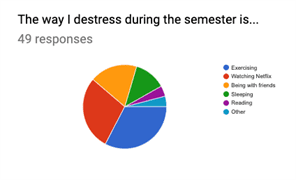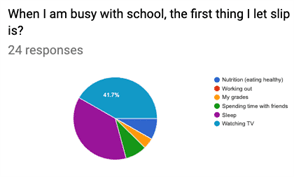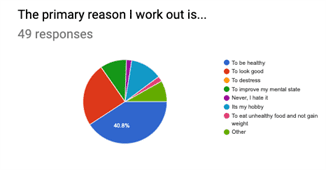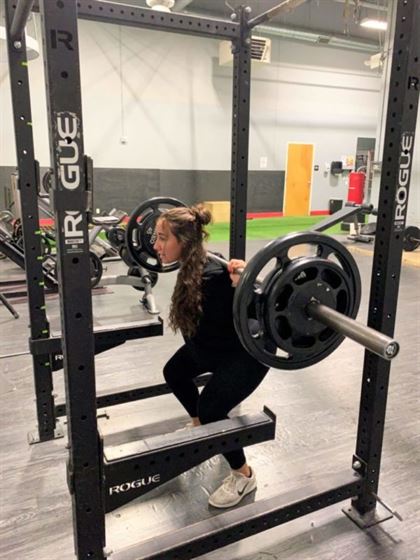As the sunshine starts to dwindle and fall begins, people tend to trade bathing in the sun for bundling up on the couch. When a new school year starts, students may throw away their fitness routines and dive into their courses and other responsibilities.
It seems logical that when pressed for time, activities that were once on the top of a list fall to the bottom. For some, exercising is the task that gets cut first.

A majority of respondents in the Facebook poll choose exercising as a way to cope with the stress of the semester. Screenshot taken by Alyssa Smolen
However, in a poll taken on Facebook with college-age (graduate and undergraduate) students ranging from 18-25, 0% of respondents reported loosening their workout regime in order to accommodate their busy schedule. In addition, 33% of students reported exercising as their primary way to de-stress while 29% reported watching Netflix.
Mallory Griffin, a graduate student getting her masters in teaching, discussed how she deals with stress.
“When I begin to feel really stressed or overwhelmed, I’ll go on a bike ride or long walk and it really helps,” Griffin said. “I make the time to do that in the morning. It helps me cope with whatever stressors come my way during the day.”
If students use exercise as their primary way to de-stress, it’s likely that exercising is not something they let slip when they are busy.

No respondents in the Facebook poll cancel their workout when they get busy with school. Screenshot taken by Alyssa Smolen
“The first thing I let go of when school gets busy is hours at work. I have a hard time giving up the gym,” Alex Lavrador, a junior jurisprudence and political science major, said. “It’s the only time I take for myself and my mental and physical health are essential to a good education.”
Regular exercise can reduce the risk of a heart attack, plus lower blood cholesterol and blood pressure. Although all of these benefits are great reasons to get your sweat on, this list is not what many young people are considering when they throw on a pair of trainers. College-age students tend to be less worried about the daunting factors of aging and the health conditions that seem to come with it.

Over 40% of respondents on the Facebook poll hope to see improved health from exercising. Screenshot taken by Alyssa Smolen
In the same Facebook poll, 25% of people reported they exercised “to look good,” 41% reported “to be healthy” and a mere 10% reported to “improve their mental state.”
Reasons that a younger person may want to exercise include feeling better with more energy, improving sleep patterns and changing levels of chemicals in the brain like serotonin and stress hormones.
Serotonin is a chemical in the brain that plays a role in depression. Studies have shown that exercising has the ability to change brain chemicals and raise serotonin levels. In fact, 33% of students who were surveyed in a 2014 study reported having suffered from depression.
When spring rolls around there seem to to be a lot of ads on TV, social media and the radio to “get fit for summer,” with crazy and unhealthy ways to shed weight and tone up for a bikini body.

Kathy Sullivan believes that there are more benefits to good nutrition and exercise than improving looks. Photo courtesy of Kathy Sullivan
Senior dietetics major Kathy Sullivan has noticed a trend in people that quit on their workouts early.
“I think a lot of people exercise the same way they diet; it’s just a short term thing or a fad to look good for a vacation,” Sullivan said.

This Facebook poll shows that season is not always a deciding factor when going to the gym. Screenshot taken by Alyssa Smolen
Even though the media tends to describe fitness as a trend, there is no perfect time to get fit. The majority of respondents on Facebook seem to know this, as 80% reported summer does not impact whether they exercise or not.
Knowing that exercising has the potential to improve all areas of one’s life, not just someone’s physical appearance, is crucial to maintaining a healthy relationship with fitness. This way people can be fit for a reason and not just for a season.




